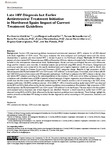Late HIV diagnosis but earlier antiretroviral treatment initiation in northwest Spain: impact of current treatment guidelines

View/
Use this link to cite
http://hdl.handle.net/2183/22209
Except where otherwise noted, this item's license is described as Creative Commons Attribution-NonCommercial 4.0 International License (CC-BY-NC 4.0)
Collections
- Investigación (FCS) [1293]
Metadata
Show full item recordTitle
Late HIV diagnosis but earlier antiretroviral treatment initiation in northwest Spain: impact of current treatment guidelinesAuthor(s)
Date
2019-01-10Citation
Cid-Silva P, Margusino-Framiñán L, Balboa-Barreiro V, Pernas-Souto B, Mena-De-Cea Á, Martín-Herranz I, Castro-Iglesias Á, Poveda E. Late HIV diagnosis but earlier
antiretroviral treatment initiation
in northwest Spain: impact of current
treatment guidelines. J Int Assoc Provid AIDS Care. 2019 Jan-Dec;18:2325958218821940.
Abstract
[Abstract] Background: Current HIV treatment guidelines recommend antiretroviral treatment (ART) initiation for all HIV-infected individuals regardless of CD4 count. This study evaluates the immunological and virological status and the clinical characteristics of patients who have started ART in the last 8 years in the Northwest of Spain.
Methods: All HIV-infected patients who have started ART between January 2009 and December 2016 at a reference hospital in the Northwest of Spain were included in this retrospective observational study. Epidemiological, clinical, and immunovirological features and antiretroviral drugs used for initiation were recorded. A statistical analysis was performed using SPSS version 19 software. Categorical and continuous variables were compared by the specific statistical tests, and a logistic regression model was used to identify time associated with Center for Disease Control and Prevention (CDC) categories change.
Results: A high proportion of HIV-infected patients (66.7%) had initiated ART with CD4 counts <350 cells/mm3 in the last 8 years. From these, most of them (68.3%) had <350 CD4 counts at first contact with HIV specialist medical team, 12.2% had no indications for ART initiation in the last clinic visit before ART initiation according to the national guidelines at that moment, 11.0% were lost to follow-up because of lack of compliance with scheduled visits and 8.5% of patients refused treatment. A logistic regression model showed that a delay of one month since the first contact with HIV specialist medical team to ART initiation involves a risk of worsening in the CDC clinical category (odds ratio: 1.02 [95% confidence interval: 1.012-1.029]; P < .001). A trend towards an earlier start of ART was observed during 2015 and 2016, likely influenced by the last treatment guidelines recommendations.
Conclusion: High proportion of HIV-infected patients (66.7%) had initiated ART with CD4 counts <350 cells/mm3 in the last 8 years. The main reasons for this problem were analyzed and an important rate of late diagnosis was identified. However, a trend towards an earlier start of ART was observed during 2015 and 2016, likely influenced by the last treatment guidelines recommendations. These findings highlight the need to promote and facilitate HIV testing to reduce the late diagnosis as well as counseling on HIV prevention, treatment, and linkage care.
Keywords
HIV
Antiretroviral therapy
CD4 count
Late diagnosis
Antiretroviral therapy
CD4 count
Late diagnosis
Editor version
Rights
Creative Commons Attribution-NonCommercial 4.0 International License (CC-BY-NC 4.0)
ISSN
2325-9574






